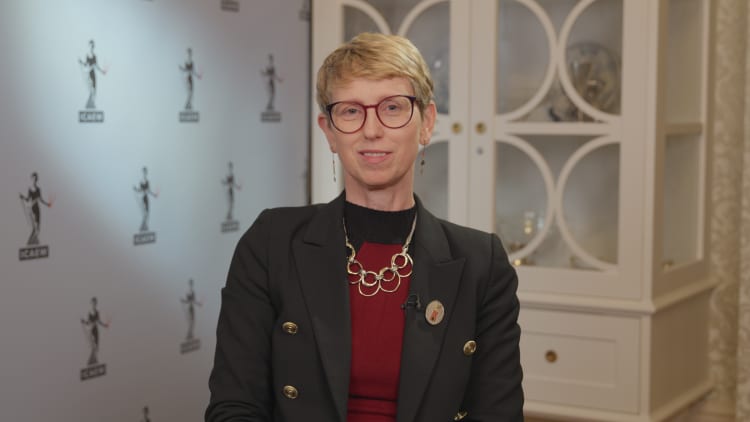Becoming a new mother is an emotional experience, so much so that it can be easy to forget about your own needs the moment you lay eyes on your baby.
But it's just as important to look after your mental health as it is to take care of your baby, says Dr. Navya Mysore, a primary care physician and the national program director for sexual and reproductive health at One Medical.
"After you deliver, there's a lot of hormonal changes that are happening," Mysore tells CNBC Make It. "Generally, when someone feels low or blue or weepy, it can be postpartum blues."
Postpartum blues typically last for two to six weeks after delivery. If symptoms continue or worsen beyond the four- to six-week mark, it can indicate that a parent is struggling with postpartum depression, Mysore says.
A new mother experiencing postpartum depression may notice the following:
- Feeling more isolated
- Experiencing a lack of motivation
- Crying more often than usual
- Having thoughts about self harm or harming their baby
- Finding it hard to bond with their baby (This symptom can be normal for certain parents and not a sign of PPD in some people. "Sometimes it can just take a little more time to bond with your baby," Mysore says.)
Thankfully, there are certain steps you can take to prioritize your mental health after your baby is born.
7 ways new parents can prioritize their mental health
Mysore tells her patients to take simple steps that can help ease them into motherhood.
"If you're not doing the things that really fill your cup, then it starts to take away from you and you can burn out really easily," she says. "Just as you burn out with work, you can burn out with parenting."
Here are a few practices Mysore suggests:
- Prep before your baby arrives: Planning to have loved ones with you for the first week postpartum to help you recover may ease the transition into this new experience.
- Ask for help if you need it: Don't do everything on your own. Ask for help with changing diapers and take a break to enjoy a shower. Sometimes it can even be as simple as asking someone to keep you company, Mysore says.
- Pause and step outside: Go outdoors for some fresh air, even if just for a few minutes. "I remember with my first, we didn't leave the house for like eight days," Mysore says. "And when I left the house, I was like, 'Oh, my god! I feel human again.'"
- Take a break from social media: For some new parents, scrolling on social media can cause them to compare themselves to other new parents and feel less productive, Mysore says. Put your phone away and grab a book or watch some TV instead, she suggests.
- Give yourself grace: It's important to not compare what you were able to do before having a baby to what you're able to do now. "Those first [few] weeks I call it 'the trenches,'" Mysore says. "Your reality is different."
- Keep your to-do list short and easy: The tasks on your list can be as simple as taking a shower. At the end of the day, "you'll have a sense of accomplishment like, 'I'm still doing something for myself to help take care of me,'" Mysore says.
- Check in with your doctor if you need to: Some primary care physicians, like Mysore, offer the option of checking in before your six-week checkup with your gynecologist.
With these suggestions, Mysore says, new parents can help keep their cup full.
"When your cup is full, you're able to give to others around you," she says. "And this is the same when it comes to your baby."
DON'T MISS: Want to be smarter and more successful with your money, work & life? Sign up for our new newsletter!
Get CNBC's free report, 11 Ways to Tell if We're in a Recession, where Kelly Evans reviews the top indicators that a recession is coming or has already begun.



